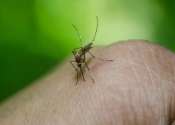What can you do if you think your teen already has unhealthy social media habits?
Many parents are worried about how much their children use social media and what content they might encounter while using it.
Jul 4, 2024
1
0
Many parents are worried about how much their children use social media and what content they might encounter while using it.
Jul 4, 2024
1
0

Analysis of the medical records of nearly 50,000 people who experienced dengue fever in Taiwan suggests that this disease is associated with elevated short- and long-term risk of depression. Hsin-I Shih and colleagues of ...
Jul 3, 2024
0
1

University of Houston, associate professor of electrical and computer engineering Bhavin R. Sheth and former student Adam Jones, have introduced a groundbreaking approach to sleep stage classification that could replace the ...
Jul 2, 2024
0
0

Road trips are a summer tradition for many families, but some drivers are so focused on reaching their destination that they tend to ignore their bodies' need for sleep. However, Baylor College of Medicine's Dr. Philip Alapat ...
Jul 1, 2024
0
0

Measuring the level of homocysteine—an amino acid—in the blood can help predict a person's risk of developing obstructive sleep apnea, a disorder characterized by recurrent interruptions in breathing due to relaxation ...
Jul 1, 2024
0
11

A new study has uncovered the pivotal role of a brain structure called the claustrum in regulating engagement, from deep sleep to waking behavior.
Jul 1, 2024
0
6

Bringing a puppy home is usually a happy event, but sometimes the life change that comes with it can provoke significant negative emotions. In a study now published in npj Mental Health Research, researchers found that almost ...
Jun 28, 2024
0
55

The loss of social memories caused by sleep deprivation could potentially be reversed using currently available drugs, according to a study in mice presented at the Federation of European Neuroscience Societies (FENS) Forum ...
Jun 27, 2024
0
24

For a typical American toddler, naps are a much-despised part of the prescribed daily routine. As we age, though, naps become rarer—yet more desirable—with each new stage of life.
Jun 27, 2024
0
0

In continuing research, West Virginia University researchers will put a sleep apnea detection device at the fingertips or wrists of patients, facilitating early diagnosis and treatment of the disease.
Jun 25, 2024
0
0

Sleep is a natural state of bodily rest observed in humans and other animals. It is distinguished from quiet wakefulness by a decreased ability to react to stimuli, and it is more easily reversible than hibernation or coma. It is common to all mammals and birds, and is also seen in many reptiles, amphibians, and fish. In humans, other mammals, and a substantial majority of other animals that have been studied (such as some species of fish, birds, ants, and fruit flies), regular sleep is essential for survival.
The purposes and mechanisms of sleep are only partly clear and are the subject of intense research.
This text uses material from Wikipedia, licensed under CC BY-SA